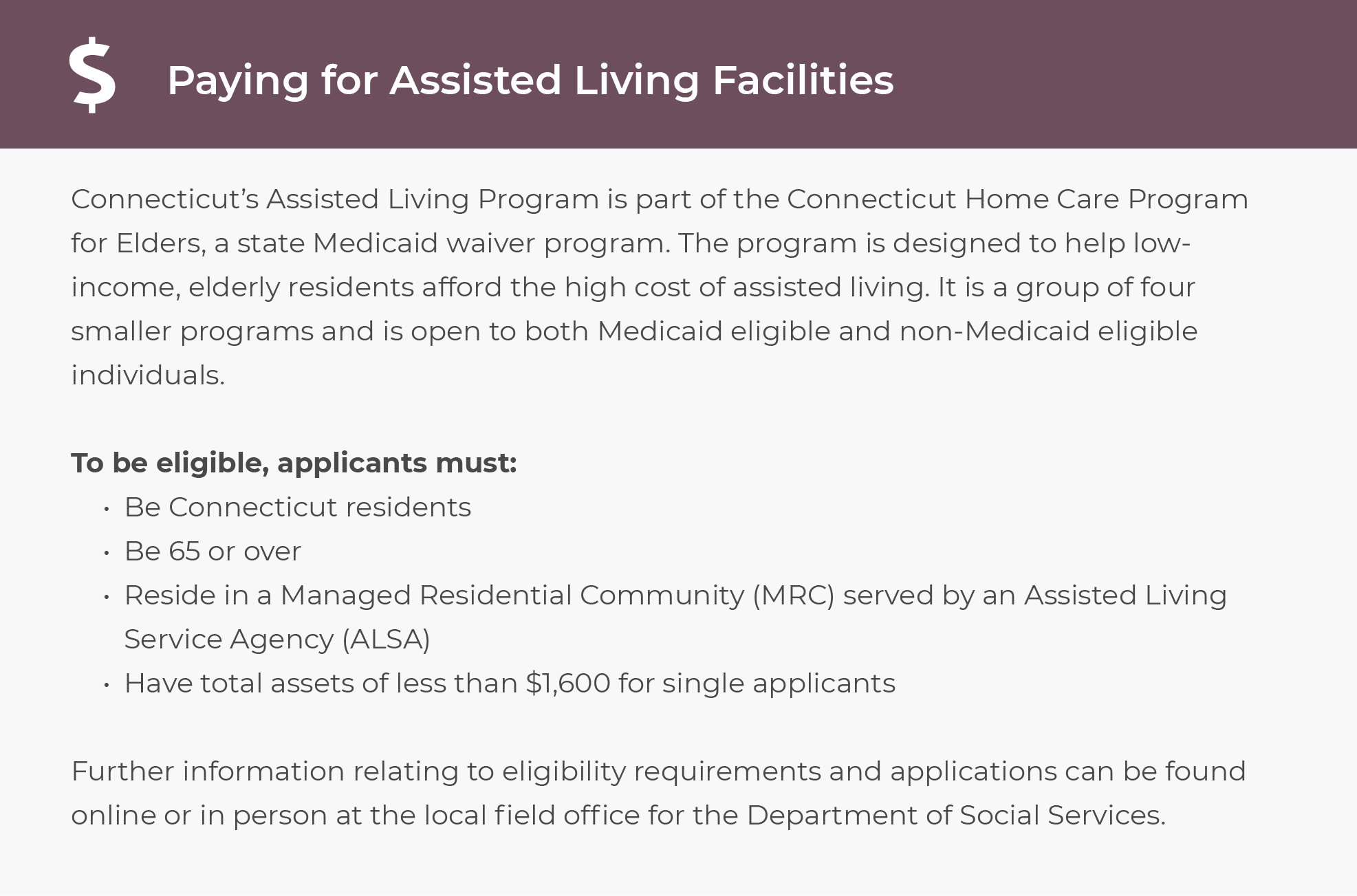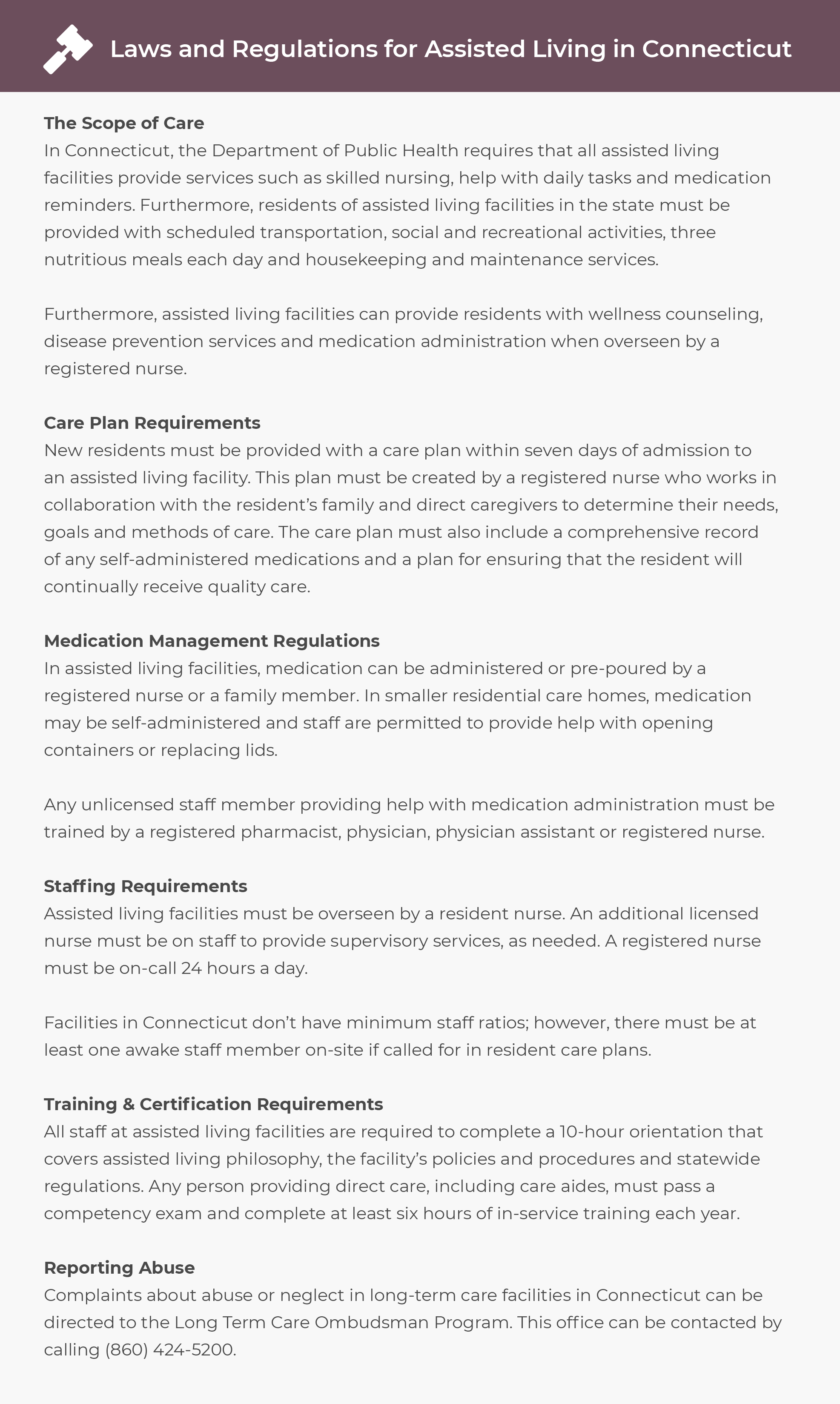Hartford, the capital of Connecticut, boasts a historic urban core with plenty of heritage buildings and greenery. The city has a population of 121,054 that includes about 14,000 seniors, and it’s home to one of the highest concentrations of baby boomers in the U.S., with services to accommodate that aging population. There are many medical facilities and specialists in Hartford, which ranks first statewide in the number of hospitals per square mile. Seniors interested in a culturally and ethnically diverse city with a rich arts and music scene and many volunteer opportunities might consider living in Hartford.
Assisted living facilities foster healthy and comfortable aging by helping seniors with everyday tasks. The facilities provide meals, transportation, personal care and social activities in a homelike setting, but they don’t typically offer extensive medical care. Seniors in Hartford pay a monthly average of $5,225 for assisted living, which is near the normal statewide cost of $5,129.
This guide offers information to seniors and family members about assisted living in Hartford. You’ll find an overview of assisted living costs, ways to pay for assisted living, laws and regulations protecting assisted living residents and community resources for Hartford seniors.
Hundreds of thousands of American seniors utilize assisted living, a figure that is only growing. For these seniors, assisted living combines residential housing,assistance in daily activities, and some healthcare. These communities also strive to provide an atmosphere that is comfortable and engaging for their residents… Read More >
COVID-19 restrictions and rules for Assisted Living Facilities are typically set by the state – to see the rules in your state, you can read our guide to Assisted Living in Connecticut. Keep in mind that there may be other policies that communities put in place to protect their residents, so you should contact your local community for more information. Additionally, you can contact your local Area Agency on Aging to learn more – find contact information here.
On average, Hartford seniors pay $5,225 per month for assisted living.
Seniors living in Hartford pay slightly more than the median statewide cost of $5,129 for assisted living. Both fees are significantly higher than the national norm of $4,500.
The average costs of assisted living in Connecticut and bordering states tend to increase in more populous cities. Hartford is more expensive than the coastal New Haven ($5,088) to the south, and both are pricier than Norwich ($4,300) to the east. Bridgeport ($6,273), the nearest city surveyed to New York State, has the most residents and the highest cost of assisted living in Connecticut. Meanwhile, seniors can expect a wider range of costs in nearby states. Facilities in Providence, Rhode Island ($6,063) charge considerably more than Hartford. But Massachusetts cities vary widely, with Boston ($6,819) among the most expensive and Pittsfield ($2,084) charging the least.

Since not everyone can afford to pay for assisted living out-of-pocket, it’s important to find alternative methods to help make assisted living more affordable. Some of these options include:
For more information about your options for making assisted living more affordable, visit our guide to Assisted Living in Connecticut.
| Resource | Contact | Service |
| North Central Area Agency on Aging (NCAAA) | (800) 994-9422 | The NCAAA offers free healthy aging information, benefits assistance and community referrals to Hartford seniors. The agency’s Live Well workshops connect seniors to trained facilitators for help with chronic physical and mental health conditions. Additionally, the CHOICES program provides unbiased guidance on accessing government and health care benefits, including Medicare. Seniors can also receive advice and referrals regarding assisted living options and quality of life issues. |
| Greater Hartford Legal Aid | (860) 541-5000 | Greater Hartford Legal Aid provides seniors free legal advocacy and representation. The agency partners with community groups to provide remedies to health care, safety and government benefits issues. |
| Dial-A-Ride | (860) 757-4747 | Seniors aged 60 and older can call the City of Hartford’s Dial-A-Ride line for free transportation services. The program provides trips within the city to medical appointments, grocery stores and senior centers. |
| Hartford Vet Center | (860) 563-8800 | The Hartford Vet Center is a free community gathering place where veterans can receive counseling and support services. Trained counselors offer individual and group sessions for grief, bereavement, couples issues, post-traumatic stress disorder and many mental health conditions. Some counseling options are specific to veterans from certain combat eras, and they all provide evidence-based therapies. Veterans can also get help applying for VA education, housing and medical benefits. The center’s large referral network can connect veterans to other resources in Hartford if needed. |
| Greater Hartford-Central CT Retired and Senior Volunteer Program (RSVP) | (860) 519-3484 | Through RSVP, seniors aged 55 and older can contribute their talents and knowledge to volunteering opportunities. The program allows seniors to choose the work they want to do at a nonprofit organization or a school. Some opportunities involve helping other seniors with meals and transportation to medical appointments, and working with residents of all ages to develop literacy skills. Volunteers receive regular training and support. |
| Senior Centers | (860) 757-4700 | There are three senior centers in Hartford: the North End Senior Center, the South End Wellness Senior Center and the centrally located Parkville Senior Center. At each, seniors aged 55 and older can receive information on health insurance, health and wellness, volunteering opportunities and other aging-related matters. The centers also coordinate recreational activities and intergenerational programming. |
Assisted Living Facilities in the Hartford area are required to follow a set of rules and regulations that are determined at the state level. For an overview of those rules and regulations, see the information below. For more specific information, talk with your local community or Area Agency on Aging.






















